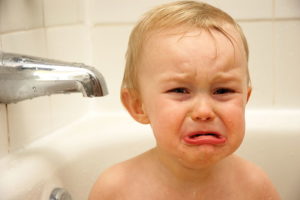Dealing with children also means learning to handle certain situations you never imagined existed. With each new stage of childhood, new things about your children are discovered, and new challenges arise for dealing with fears, habits, and tantrums. Fear of bathing, for example, is one of the most common and can happen to children of all ages. However, although it may seem like just a phase, this fear can develop into something more serious, even requiring medical treatment in more severe cases. But how do you know if that’s what your child is experiencing? Let’s talk more deeply about ablutophobia (fear of bathing), its causes, and the consequences it can bring.
What is Ablutophobia?
Ablutophobia is the term for a severe or irrational fear of bathing that is very common in children, but it also occurs in adults, especially women. Ablutophobia is a pathological condition, meaning that this fear becomes a medical issue, interfering with the child’s life and the lives of those around them, making treatment necessary to return to normal living. Certain tasks like washing hair or even washing hands, for instance, can become very difficult or impossible for someone with ablutophobia, which can trigger a series of other problems.
Causes of Fear of Bathing
There are several reasons why a child may develop a fear of bathing. Traumas such as near-drowning or a very bad experience with water can cause this fear to grow even more, especially if parents allow it to escalate. Horror movies can also cause a child to develop a fear of bathing. There are even reports of people who developed ablutophobia after watching Alfred Hitchcock’s 1960 movie, Psycho. Certain psychological disorders such as OCD (obsessive-compulsive disorder) may also trigger ablutophobia. In this case, the primary condition must be treated first in order to achieve a cure.
Consequences of Fear of Bathing
In general, society does not usually accept people who don’t bathe very well. That’s why we must first mention the social and psychological consequences that ablutophobia can bring. Childhood is a stage where children are gradually learning to interact with others and to live in groups. A child who seldom bathes or doesn’t bathe at all ends up being isolated from others, which can strongly affect their psychological development. This can also affect parents in some way, since they are directly responsible for keeping their child clean and hygienic. There are also physical consequences, since an unbathed body is much more likely to harbor bacteria, which can develop into various kinds of diseases. For this reason, a child who doesn’t bathe is much more likely to become ill. 
Treatment for Fear of Bathing
Treatment for this type of condition should be carried out by a specialized therapist who knows how to deal with these kinds of problems. The therapist clarifies the irrationality of the fear and the consequences that this problem can have on a person. Of course, this conversation is undertaken from a specialist’s perspective—in other words, it is not effective for just anyone to try to explain to a child that fear of bathing is silly, because a therapist knows the appropriate language to use, as well as techniques to earn the patient’s trust and delve into deeper issues like this.
How Can You Help Your Child Overcome Fear of Bath Time?
Although ablutophobia is real, fear of bathing isn’t always a pathology. In reality, it’s only considered a disorder when the problem starts to interfere with the child’s and family’s life and persists for around 6 months. Some children simply don’t like to take a bath, perhaps for reasons similar to those that cause ablutophobia, but with a smaller impact—these cases can often be managed by parents. Parents should pay attention to whether the problem is persistent and should try to show their children that bath time is a pleasurable and cleansing experience, a time to relax and unwind. Taking baths together with your child can be a good strategy and may help the child overcome the fear.
How to Bathe a Baby?
Bath time should be a pleasurable and relaxing moment for a baby. There are some tips you can follow on how to bathe a baby that can help turn what might be a difficult task into a pleasant time. To bathe a baby, ideally the water should be lukewarm and still, meaning no showers. The baby’s body should be gently washed, helping them to feel comfortable and relaxed from your touch. Only use products (shampoos and soaps) that are specifically for babies or approved by dermatologists to avoid allergies.
ATTENTION: Under no circumstances should you leave your baby alone during bath time. Any lapse in attention can have serious consequences, such as drowning.
Fear of bathing can be very serious and may require special attention from a mother or father or even a medical specialist to help the child overcome this phobia, but it’s also important to remember that not every case of fear of bathing is necessarily a clinical issue that needs treatment. Many times, we can deal with these small problems common to many children simply by following a few steps and managing our children better. So, don’t panic if your child is afraid of the bath—most likely, it’s just a phase and one you can help them overcome with relative ease. However, if this problem drags on for a long time, seek help and don’t despair—there are certainly many ways to ensure this problem is only temporary and doesn’t affect your child’s life. See Also: Bucket Bath – When to Start? Photo: Kyle Flood











